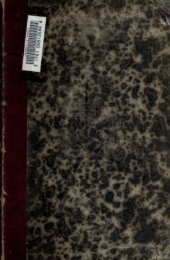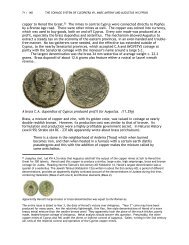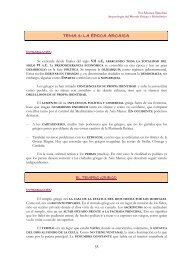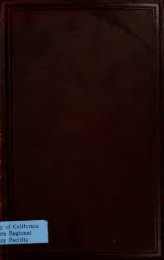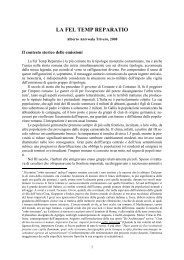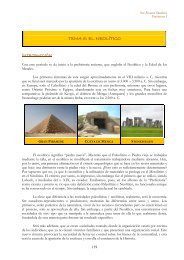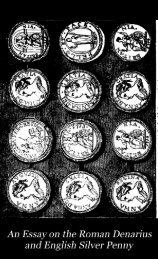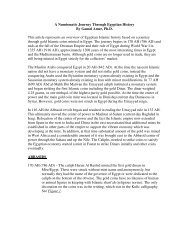Numismata hellenica: a catalogue of Greek coins; with notes, a map ...
Numismata hellenica: a catalogue of Greek coins; with notes, a map ...
Numismata hellenica: a catalogue of Greek coins; with notes, a map ...
You also want an ePaper? Increase the reach of your titles
YUMPU automatically turns print PDFs into web optimized ePapers that Google loves.
Gfoi S(orr/i)f(,'. Ptolemy I., and his wife Berenice so entitled<br />
after their deaths, K. 59-<br />
Theos, origin <strong>of</strong> this epithet <strong>of</strong> Antiochus II. <strong>of</strong> Syria,<br />
K. 23.<br />
Thera a Laconian colony, in all ages populous ; hence its<br />
<strong>coins</strong> various and numerous, Ins. 46.<br />
Thermae Hiraereeae. See Himera.<br />
Therme. See Thessalonica Macedoniae.<br />
Thermopylae, Antiochus the Great there defeated by the<br />
Romans, K. 25.<br />
Theron sends a Doric colony from Acragas to Himera<br />
Siciliae in 476 b.c, Ins. 58.<br />
Thespiae (Boeotiae), its remains at Lefka; monetary league<br />
between it and Tanagra and Plataeae; the grove <strong>of</strong> the<br />
Muses at Mount Helicon in its territory, Eu. 100.<br />
Thessalia, the autonomous money <strong>of</strong> its cities ceased before<br />
the Roman Empire; its three temples <strong>of</strong> Pallas Itonia,<br />
Eu. 101.<br />
Thessalonica (Macedoniae), its ancient name preserved,<br />
but converted by the Italians into Salonica; anciently<br />
entitled Therme, from some hot sources there; called<br />
Thessalonica by Cassander, in honour <strong>of</strong> his wife Thessalonice<br />
; the types <strong>of</strong> its <strong>coins</strong> relative to the Cabeiri<br />
and Dioscuri, Eu. 104.<br />
Thothorses, king <strong>of</strong> Bosporus, a contemporary <strong>of</strong> Diocletian,<br />
K. 51.<br />
Thuria (Messeniae), its <strong>coins</strong>, Eu. 106.<br />
Thurium or Thurii an Athenian colony near Sybaris, at a<br />
fountain called Thuria, Eu. 152: its prosperity not<br />
lasting; its power eclipsed by Heracleia; colonized and<br />
named Copia by the Romans, Eu. 153.<br />
Thyateira (Lydiae), now Ak-hissar, on the road from<br />
Pergamum to Laodiceia, As. 134.<br />
Thymbres or Thymhrius, now the Pursek, written TefiPptg<br />
on a coin <strong>of</strong> Midaeiura; the Tiberis <strong>of</strong> Italy, a name<br />
carried there by the Pelasgi, As. 82. 103.<br />
Thyrea (Argolidis), reasons for attributing to this city a<br />
class <strong>of</strong> <strong>coins</strong> generally ascribed to Argos, Eu. 164.<br />
Thyrrheium (Acarnaniae), Corinthian types upon its <strong>coins</strong>,<br />
'<br />
Eu. 8: those twv AKapvdvuv struck there, Eu. 106:<br />
Nicopolis Epiri partly peopled by its inhabitants, Eu.<br />
8.76.<br />
Tiberiopolis (Phrygiae), flourishing in the time <strong>of</strong> Caracalla,<br />
and a bishoprick in the thirteenth century, As.<br />
134.<br />
Tiella. See Stiala.<br />
Tigranes, king <strong>of</strong> Armenia, conquers Philip <strong>of</strong> Syria and<br />
occupies his dominions, K. 37 : deprived <strong>of</strong> them by<br />
Lucullus in b.c. 69, K. 38.<br />
Timesius the leader <strong>of</strong> the Clazomenian colony to Abdera,<br />
Eu. 1.<br />
"Kmotheus, tyrant <strong>of</strong> Heracleia Bithyniae, As. 65.<br />
Tium (Bithyniae), a Milesian colony; its name said to have<br />
been derived from its founder Teius, a priest <strong>of</strong> Miletus,<br />
As. 135.<br />
Tomis (Moesiae Inferioris), a Milesian colony on the western<br />
coast <strong>of</strong> the Euxine ; the place <strong>of</strong> Ovid's exile, Eu.<br />
107.<br />
Topeirus (Thraciae) near the river Nestus, Eu. 107.<br />
Torone or Terone (Macedoniae), in the Sithonian peninsula,<br />
in early times the chief city <strong>of</strong> the Chalcidenses <strong>of</strong><br />
Macedonia; its ancient name preserved in its ruins;<br />
no imperial <strong>coins</strong> <strong>of</strong> it extant, Eu, 33. 107.<br />
frachinii, this people a portion <strong>of</strong> the Malienses ; position<br />
<strong>of</strong> their city Heracleia, Eu. 80.<br />
Tragilus (Thraciae sive Macedoniae), its <strong>coins</strong> generally<br />
attributed to a supposed Traelium, Eu 108.<br />
Tragurium, now Trau, a colony <strong>of</strong> Issa Adriae,— not an<br />
island, as described by Strabo, Ins. 22.<br />
INDEX TO THE NOTES. [39<br />
Trajanopolis or Augusta Trajana (Thraciae"), remains <strong>of</strong> it<br />
near the Hebrus, at the modern Fdreh, Eu. 108.<br />
— (Phrygiae) built under the Roman empire upon<br />
a more ancient site. As. 134.<br />
Tralles (Lydiae) colonized from Argos; joined by the Treres,<br />
from whom the name is derived ; surnamed Coesareia<br />
in honour <strong>of</strong> Augustus ; its worship <strong>of</strong> Jupiter Laris-<br />
saeus. As. 135.<br />
Trapezopolis (Cariae) situated probably between Laodiceia<br />
ad Lycum and Antioeheia Cariae, As. 136.<br />
Trapezus (Ponti) a colony <strong>of</strong> Sinope; joined by all the<br />
inhabitants <strong>of</strong> the Arcadian Trapezus ; flourishing when<br />
visited by Xenophon; its ancient name preserved in<br />
the usual Romaic form Tpa7reJoii>'7-a, As. 136.<br />
Treres a Thracian people who invaded Asia and founded<br />
two cities called Trarium, one in jEolis, the other in<br />
Bithynia, and afterwards penetrated to the Maeander,<br />
drove out- the Magnetes, and gave name to Tralles<br />
Lydiae, As. 135.<br />
Tricca (Thessaliae), now Trikkala, the reputed birthplace<br />
<strong>of</strong> Asclepius ; hence his figure on its <strong>coins</strong> as well as<br />
the usual Thessalian types, Eu. 108.<br />
Triraontium, Philippopolis Thraciae so named in Roman<br />
times from three rocks in the plain, Eu. 92.<br />
Tripolis (Cariae) probably the Callatebus <strong>of</strong> Herodotus ;<br />
its situation, As. 136, 137: Latona and her children<br />
apparently the chief objects <strong>of</strong> worship there, As.<br />
149.<br />
(Phoeniciae) so called from having received colonies<br />
from Aradus, Sidon, and Tyre, each <strong>of</strong> which had<br />
a separate wall; commencement <strong>of</strong> its autonomy upon<br />
the victory <strong>of</strong> Pompey over Tigranes in 64 b.c. ; use <strong>of</strong><br />
the Seleucid aera resumed by its inhabitants under<br />
Augustus; Antony and Cleopatra in the character <strong>of</strong><br />
the Dioscuri upon one <strong>of</strong> its <strong>coins</strong>; its double sera.<br />
As. 137.<br />
TrcEzen or Posidonia, now Damala, its <strong>coins</strong> as member <strong>of</strong><br />
the Achaian League, Eu. 5 : types <strong>of</strong> its <strong>coins</strong> in correspondence<br />
<strong>with</strong> its temples <strong>of</strong> Apollo, Diana, and<br />
Neptune, Eu. 109. 165.<br />
Tryphaena, daughter <strong>of</strong> Ptolemy Physcon, married to<br />
Antiochus VIII. <strong>of</strong> Syria, K. 33.<br />
Tryphon a name by which Diodotus <strong>of</strong> Apameia, king <strong>of</strong><br />
Syria, was generally known, K. 29.<br />
Tuder, now Todi, on the Upper Tiber, a chief city <strong>of</strong> Umbria,<br />
Eu. 154.<br />
Tyana (Cappadociae), its remains at Kilis Hissar, near<br />
Bor; named Eusebeia wpbc rif Taipif) by one <strong>of</strong> the<br />
kings <strong>of</strong> Cappadocia, As. 139.<br />
Tyaneius.<br />
See Briana Phrygiae.<br />
Tylissus (Cretae), its name still preserved ; situated on a<br />
height above the sea to the west <strong>of</strong> Megalo Kastro (Candia).<br />
Ins. 46.<br />
Tyndaris, its ancient name preserved; founded and populated<br />
<strong>with</strong> Messenii by Dionysius I. ; the Dioscuri there<br />
chiefly honoured, Ins. 48. 78.<br />
Tyras (Sarmatis) on the river Tyras (Dneister), one <strong>of</strong> the<br />
Milesian colonies <strong>of</strong> the Eu.Yine, Eu. 109.<br />
Tyrus (Phoeniciae), colonizes Libya and Iberia, As. 114:<br />
a principality under the Persians, <strong>coins</strong> money <strong>with</strong><br />
Phoenician legends and types until the Macedonian<br />
conquest ; <strong>with</strong> Phoenician legends and the king's head<br />
under A ntiochus IV. and Demetrius I.; becomes autonomous<br />
at the death <strong>of</strong> Demetrius II., and a Roman<br />
colony under Septimius Severus; latest date on its <strong>Greek</strong><br />
<strong>coins</strong> 324 (= A.D, 198), As. 139.



